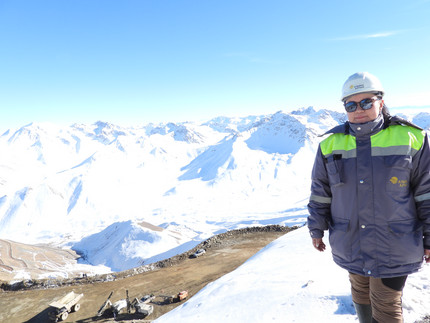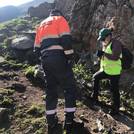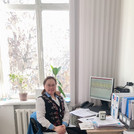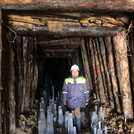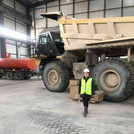Baiansuluu Terbishalieva, M.Sc.
Wo arbeitest du und was ist deine Aufgabe?
Zurzeit arbeite ich als Geoexplorationsgeologin bei der „Alliance Altyn“ Jerooy Gold Mining Company in Kirgisistan. Ich suche im Gelände nach perspektivischen Mineralisierungen im Goldbergbaugebiet. Wenn ich ein potenzielles Gestein sehe, nehme ich in diesem Gebiet Proben. Ich zeichne GPS-Punkte in eine Karte ein, entnehme Proben, mache einen Dünn- oder Dickschliff (je nach meiner Forschungsfrage) und mache sogar mehrere Fotos mit Markierungspunkten im Maßstab. Ich schreibe jedes Detail, das ich erwähnenswert finde, in mein Feldbuch, z. B. warum dieses Gebiet meine Aufmerksamkeit erregt, insbesondere Störungszonen, Quarzadern usw. Dann mache ich eine Kartierung und erstelle ein 3D-Modell mit Programmen wie MapInfo, Global Mapper und Macromine. Nachdem ich die Ergebnisse (Au (ppm) oder andere potenzielle Elemente) der von mir entnommenen Proben erhalten habe, erwäge ich weitere Schritte für detailliertere Untersuchungen, wie z. B. das Ausheben eines Grabens oder das Bohren eines Lochs.
Welches waren deine vorherigen beruflichen Stationen?
Nach Abschluss meines Masterstudiums an der Universität Potsdam bekam ich eine Stelle als Geochemikerin in einem der besten, größten und hervorragend qualifizierten Labors in Zentralasien: bei den Stewart Assay and Environmental Laboratories LLC, Kirgisistan. Diese Stelle erhielt ich aufgrund meiner Arbeitserfahrung im Thermochronologie-Labor an der Universität Potsdam und am GFZ (Deutsches GeoForschungsZentrum) als studentische Hilfskraft während meines Studiums. Ich muss erwähnen, dass ich dort viel gelernt habe, auch MSF-Dateien für ICP-OES zu erstellen und AAS, ICP-OES, ICP-MS etc. zu bedienen. Ich bin Dr. O. Sadyrov und seinem professionellen Team sehr dankbar.
Wie bist du zu deinem jetzigen Job gekommen?
Während meiner Arbeit in den Stewart Assay and Environmental Laboratories erhielt ich einen Anruf von meinem Freund und alten Kollegen von der geologischen Expedition in Nord-Kirgisien (wo ich gearbeitet habe, bevor ich mich für ein Masterstudium an der Universität Potsdam beworben habe).
Was hat dich da an dem Job gereizt?
Die Jerooy Gold Mining befindet sich in der Region Talas (nördlicher Teil Kirgisistans), wo Goldmineralisierung in Verbindung mit Stockwork-Zonen entlang der Ichkeletau-Susamyr-Verwerfung stattfindet. Jeden Tag untersuche ich die Geschichte der Goldmineralisierung innerhalb der Verwerfung, indem ich Beweise aus kleinen Rissen im Gestein, der Ausrichtung des Adersystems und den Materialien innerhalb der Verwerfung sammle.
Außerdem leben meine Eltern in der Nähe, und ich habe die Möglichkeit, sie alle 2 Wochen zu besuchen und Zeit mit ihnen zu verbringen.
Welche sind die wichtigsten Fähigkeiten, die man für diese Arbeit mitbringen sollte?
Ich denke wichtige Fähigkeiten sind sehr gute Kenntnisse in der Mineralienbestimmung, Strukturgeologie und Kartierung; außerdem sollte man über den Tellerrand hinausschauen und Geologie wirklich lieben.
Wie sieht eine typische Arbeitswoche bei dir aus?
Das hängt von der jeweiligen Jahreszeit ab. Im Sommer versuchen wir zum Beispiel, die Feldarbeit zu erledigen, sobald das Wetter warm genug ist. Die Jerooy Gold Mining liegt über 3500 Meter über dem Meeresspiegel, so dass wir zwei Wochen dort arbeiten und dann zwei Wochen frei haben.
Im Herbst erstelle ich geologische Beschreibungen des Tagebaus und stelle die Abgrenzung von Störungszonen dar.
Im Winter mache ich akademische Forschungsarbeit - das ist mein Lieblingsteil. Ich beschäftige mich mit Mineralogie, Petrologie und Geochemie. Dann schreiben meine Kollegen und ich wissenschaftliche Zusammenfassungen oder Berichte zum Thema „Wo ist Gold und wie viel“?
Im Frühjahr dokumentiere ich Bohrkerne und bereite einen neuen Arbeitsplan für den kommenden Sommer vor.
Was gefällt dir an deinem Beruf und was fordert dich am meisten heraus?
Ich mag die Freiheit, die ich jetzt habe, und ich habe Kollegen (aus verschiedenen Ländern und mit unterschiedlichem Hintergrund), von denen ich neue Dinge lernen kann. Die größte Herausforderung ist es, eine Antwort auf meine Frage zu bekommen: „Wie und wann hat sich Gold in diesem Gebiet gebildet“?
Wie viel von dem erlernten Wissen aus deinem Studium brauchst du in deinem Job?
Ich denke, das nützlichste Wissen, das ich an der Universität Potsdam gelernt habe, ist, die richtigen Fragen zu stellen. Außerdem habe ich gelernt, wie man die Daten aus allen neuen Technologien nutzt, die wir während des Studiums in Potsdam eingesetzt haben, wie ICP-OES, SEM, Mikrosonde usw., mit denen die Qualität der Analysen leicht überprüft werden kann.
Wie denkst du rückblickend über dein Geowissenschaftenstudium an der Uni Potsdam?
Das erste Studienjahr war für mich wirklich hart aufgrund gesundheitlicher Probleme, eines anderen Bildungssystems, der Sprache usw. Aber nachdem ich mich an das Klima und die Universität gewöhnt hatte und gelernt habe, allein zu sein, begann ich, alles aus einer anderen Perspektive zu sehen. Das Alleinsein gibt einem zum Beispiel die Möglichkeit, die richtigen Prioritäten zu setzen, herauszufinden, was einem gut tut, und sich mehr auf seine Forschung zu konzentrieren. Ich sollte auch erwähnen, dass das Institut für Geowissenschaften international ist. Das hat mir geholfen, aus meiner Komfortzone oder meiner konservativen Sichtweise herauszukommen und eine „unabhängige Forscherin“ zu werden.
Hast du Tipps für unsere Absolvent*innen für einen erfolgreichen Berufseinstieg?
Entspannen Sie sich einfach und geraten Sie nicht in Panik. Wenn Sie bereits einen Abschluss am Institut für Geowissenschaften der Universität Potsdam gemacht haben, glauben Sie mir, Sie sind schlau genug! Wenn Sie die Geowissenschaften wirklich lieben, dann suchen Sie sich nicht irgendeinen Job aus. Verfolgen Sie einfach Ihren Traum und eines Tages werden Sie am richtigen Ort sein. Wenn es in Europa nicht klappt, dann schauen Sie vielleicht nach einer Stelle in Zentralasien oder anderen Ländern?!
Kontakt:
Email 1: bayansuluu2011@mail.ru I Email 2: u-geolog@alliance-altyn.kg
Phone: +996555 755-849 I Alliance Altyn” Jerooy Gold Mining Company, Talas region

